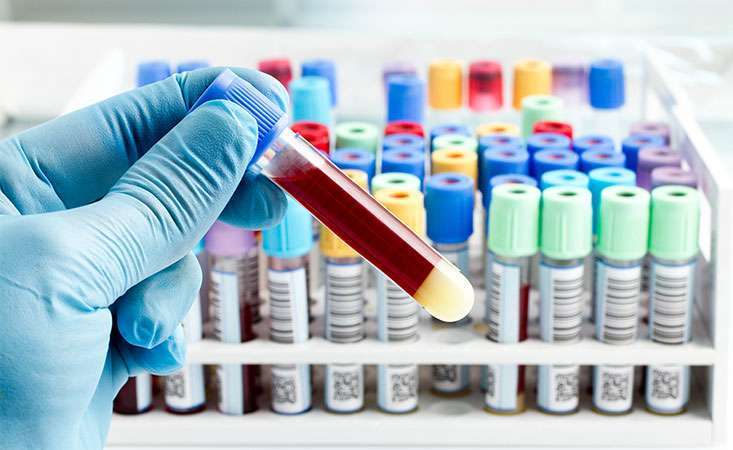On This Page:

- What Is CA 19-9?
- When Is the CA 19-9 Test Performed?
- Why Is the CA 19-9 Test Given?
- How Is the CA 19-9 Test Done?
- What Do the CA 19-9 Results Mean?
- How Often Is the CA 19-9 Test Given?
- What Other Conditions Can Cause Elevated CA 19-9 Levels?
What Is CA 19-9?
Antigens are substances that cause the immune system to respond. Carbohydrate antigen (CA) 19-9 is a type of antigen released by pancreatic cancer cells. It can also be referred to as a tumor marker.
The CA 19-9 Radioimmunoassay (RIA) is a blood test that measures the CA 19-9 level in the blood.
There are blood tests commercially available that may be able to detect pancreatic cancer. A test measuring CA 19-9 cannot detect the presence of pancreatic cancer by itself, but it can be used on a panel with other biomarkers that can signal the presence of the disease. After diagnosis, the CA 19-9 Radioimmunoassay (RIA) blood test can also be used for some patients to watch the disease’s development.
Note:
- Not every patient with pancreatic cancer will have a high CA 19-9 level.
- Some conditions other than cancer can cause high CA 19-9 levels.
- The CA 19-9 test cannot be used to diagnose or screen for pancreatic cancer by itself. Instead, doctors often use it to judge a treatment’s success.
When Is the CA 19-9 Test Performed?
Levels of CA 19-9 may be measured as part of a panel of biomarkers to detect the disease early from a blood test. Patients may also get the test after a confirmed pancreatic cancer diagnosis. If the CA 19-9 level was raised before treatment, patients may be tested during and after treatment to judge success.
Why Is the CA 19-9 Test Given?
Changes in CA 19-9 levels help doctors see if the tumor is growing, staying the same or getting smaller. This helps doctors decide if they should change treatment or run more tests or scans.
How Is the CA 19-9 Test Done?
A blood sample is taken from the patient and then sent to a lab for testing to find the level of CA 19-9 in the blood. This blood sample is measured using a radioimmunoassay, or RIA, test. Radioimmunoassay is a lab technique that can show specific substances in the blood.
What Do the CA 19-9 Results Mean?
The normal CA 19-9 range in a healthy person is 0-37 units per milliliter. CA 19-9 levels can be higher in patients with pancreatic cancer.
In general:
- Rising CA 19-9 values mean the tumor is growing.
- If the values stay the same, the disease may be stable.
- Decreasing CA 19-9 values may mean treatment is working and the tumor or amount of cancer in the body is decreasing.
- A decline in CA 19-9 levels after treatment followed by a rise later may suggest that the tumor has come back or grown.
How Often Is the Test Given?
The doctor decides how often the CA 19-9 tests are performed. If the tumor seems to be growing during treatment, the CA 19-9 test may be repeated weekly or after each round of treatment is completed.
If a patient is not receiving treatment now, the CA 19-9 test may be used occasionally to decide if that patient should restart treatment or have more testing. People who had surgery might have CA 19-9 tests as part of their follow-up care.
What Other Conditions Can Cause Elevated CA 19-9 Levels?
A high CA 19-9 is usually related to pancreatic cancer. But other cancers, like colorectal, lung and gallbladder cancers, can also cause raised levels.
Non-cancerous conditions that can cause high CA 19-9 levels include:
- Gallstones
- Biliary infection (cholangitis)
- Blockage of the bile duct (jaundice)
- Pancreatitis (swelling of the pancreas)
- Cystic fibrosis
- Liver disease
During radiation therapy, CA 19-9 levels might be raised as dying cancer cells release CA 19-9. For this reason, the test is not usually done while the patient receives radiation treatment.
We’re Here to Help
For free, in-depth and personalized resources and information on pancreatic cancer diagnosis and treatment, contact PanCAN Patient Services.
Related Topics
-
Diagnosis
See how pancreatic cancer is found, including tests used.
-
Biopsy
Understand how tissue samples are used to diagnose pancreatic cancer.
-
Treatment Types
Learn about pancreatic cancer treatment options.
-
Early Detection
See why pancreatic cancer is usually found late and what is being done to fix this.
Information reviewed by PanCAN’s Scientific and Medical Advisory Board, who are experts in the field from such institutions as University of Pennsylvania, Memorial Sloan-Kettering Cancer Center, Virginia Mason Medical Center and more.
Information provided by the Pancreatic Cancer Action Network, Inc. (“PanCAN”) is not a substitute for medical advice, diagnosis, treatment or other health care services. PanCAN may provide information to you about physicians, products, services, clinical trials or treatments related to pancreatic cancer, but PanCAN does not recommend nor endorse any particular health care resource. In addition, please note any personal information you provide to PanCAN’s staff during telephone and/or email communications may be stored and used to help PanCAN achieve its mission of assisting patients with, and finding cures and treatments for, pancreatic cancer. Stored constituent information may be used to inform PanCAN programs and activities. Information also may be provided in aggregate or limited formats to third parties to guide future pancreatic cancer research and education efforts. PanCAN will not provide personal directly identifying information (such as your name or contact information) to such third parties without your prior written consent unless required or permitted by law to do so. For more information on how we may use your information, you can find our privacy policy on our website at https://www.pancan.org/privacy/.





